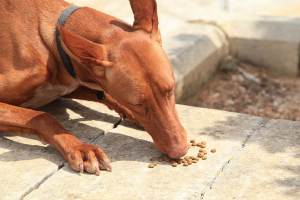
If you’re a dog loving prepper, chances are you probably maintain extra food for your canine, just as you maintain extra food for yourself and your human family members. In an emergency, we want everyone to survive, including our pets. So it’s a good idea to keep extra dog food, not just because dogs are useful to have around in bad situations, but because we also don’t like the idea of eating our pets when society collapses.
But have you thought about how you’re going to take care of your dog if his or her food runs out? If you survive a disaster that lasts longer than a few weeks, you’ll have to start thinking about what else you can feed your dog, because dog food may not available for some time. Even as society is rebuilding itself, it’s safe to assume that everyone’s first priority is going to be figuring out how to restore food production for humans. Food for dogs however, is going to be a little further down the list of our priorities. You and your dog are going to have to manage in the interim.
This means that you need to have a really good idea of what your dog can and can’t eat. Most dog owners like to joke that their pooch can eat anything, but we all know that isn’t exactly true. Having dog food alternatives like the ones suggested in this article will help you use up the less desirable parts of a meat carcasses, utilize some of your food storage preps and keep the unique needs of your furry friend in mind too. Though pretty much everyone is well aware that dogs can’t eat chocolate, there are some additional foods that many of us aren’t aware of. There’s also a few foods your dog can eat, that you probably didn’t know about.
(Full disclaimer, just as there is a lot of debate surrounding human nutrition, so it is with dogs as well. This is a list of what your dog can and can’t survive on, which isn’t necessarily the same as what is healthiest for your dog)
Foods your dog shouldn’t eat:
- Chocolate contains caffeine and a chemical called theobromine, both of which can make your dog sick. The darker the chocolate, the more toxic it is.
- For reasons that are have yet to be discovered, macadamia nuts can induce weakness, immobility, vomiting, and hypothermia in your dog.
- Just like humans who are lactose intolerant, many dogs don’t have the digestive enzymes to break down lactose, so be cautious with dairy products.
- The pits and cores of peaches, plums, and persimmons (and most fruit in general) can cause digestive obstructions. The consumption of the flesh should be kept to a minimum, due to the vitamin C content. Dogs already produce their vitamin C, and too much can make any mammal sick.
- Grapes and Raisins can lead to vomiting, diarrhea, and eventually kidney failure.
- Even though they’re pretty carnivorous, dogs have trouble eating animal fats. Regular consumption of bacon or any meat trim can lead to pancreatitis.
- Every part of the Avavado has a chemical called persin, which can cause breathing problems and nausea.
- Onions and Garlic will destroy the red blood cells in your dog, leading to anemia.
- Raw yeast dough can ferment in your dog’s stomach, producing alcohol (which dogs don’t have the same tolerance for that we do). Worst case scenario, it can produce enough gas to rupture your dog’s digestive tract.
- Remember that dogs can’t devour a bag of potato chips like most humans can, due to their body weight. The sodium content of most snack foods is simply too concentrated for their bodies to handle.
Foods your dog can eat:
- Peanut Butter
- Pasta, Rice, Bread, and Oatmeal
- Chicken, Salmon, and any lean meat in general
- Most vegetables, with the exception of anything mentioned in the previous list, as well as raw or green potatoes
- Some cheeses that have very low levels of lactose
- Eggs, but not on a regular basis
As you can see, there is a lot of crossover between the diets of humans and dogs. After all, we’re both mammals. But it seems like there are also countless human foods that can easily hurt or kill your dog. The lists above certainly aren’t conclusive either. If there’s any type of food that you’re unsure of, check out canigivemydog.com, which has a very comprehensive analysis on the canine health effects of pretty much any food you can imagine.

My ex wife ALREADY KNOWS about the “peanut butter”.